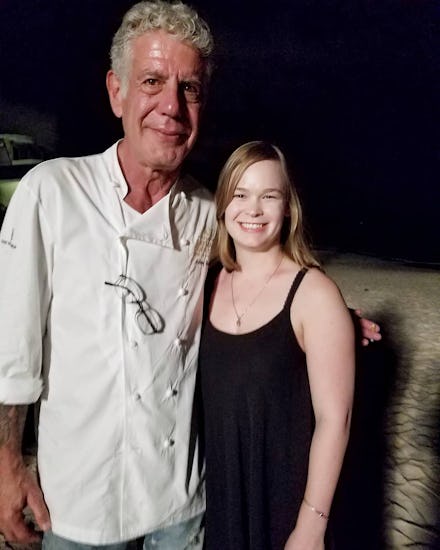Meeting Anthony Bourdain inspired me to move across the world

The first time I watched Anthony Bourdain strut across my TV screen was during the fourth episode of No Reservations. He was in Vietnam on the Island of Mr. Sang. His dark sense of humor and gleeful smile over a bowl of noodles had me smitten. When I met him over 12 years later, we talked about moving to Vietnam.
I met the traveling icon and my celebrity crush on the beach in Grand Cayman during chef Eric Ripert’s annual Cayman Cookout. And I fangirled hard. I knew I would meet him, so I had been thinking about what to say to him for days. It was hot that night, and I was sweating bullets as I walked across the sand to approach him and his girlfriend, Asia Argento, smoking, drinking Moët and talking to chef Dominique Crenn.
I tapped him on the shoulder, he turned and smiled and I awkwardly introduced myself. He was kind, gracious and relaxed. Argento took a photo of us and I asked if I could ask him something. “I’m from New York,” I said. “If you could suggest anywhere in Asia to move, where would it be?” He quickly replied, “Vietnam.” When I responded that I loved Vietnam, and Ho Chi Minh City in particularly, he replied with, “Yes, it’s a magical place.” I thanked him, he wished me good luck and I walked off with a big grin on my face. It was only a two-minute-long exchange, but it was a conversation that lit a fire in me.
Moving to Asia had long been in the cards for my partner and I, who I actually met while traveling throughout Vietnam. We weren’t sure where to start, but we knew we needed to take the chance and go.
Watching Bourdain teasingly torture his close friend Eric Ripert with spicy hot pot in China, eat pig in the Philippines and slurp ramen in a Tokyo subway station inspired a generation of people — myself included — to travel to this extraordinary continent.
For Bourdain, Asia, and especially Southeast Asia, held an alluring quality to it. His television episodes showcased the kindness of the people, the quality of the food, the odd peacefulness of honking mopeds. I felt drawn to these same locales, largely because of the way Bourdain took viewers through places like Thailand, Bali and Hong Kong. When I decided to visit years later, I rewatched all the episodes and took notes. Bourdain never steered me wrong and I quickly understood his fascination.
After our brief conversation in the Cayman Islands, I left the island feeling inspired, like so many of his episodes left me feeling. It was the first time I thought that my idea of moving across the world wasn’t so crazy — maybe I could be a full-time travel writer based throughout Asia.
After that, I got serious about making the transition and the planning quickly began. My partner and I started to contemplate when to buy our plane tickets, where to go first, how long we’d stay and as many details as we could wrap our heads around. We settled on starting in Tokyo, which also happens to be one of his favorite cities in the world.
Two days ago, I announced to my coworkers I’d be quitting my job in television to move to Asia and travel full-time. This morning was a harsh reality check that a life abroad is not always as glamorous as it might seem. But the outpouring of grief and appreciation from millions for his storytelling, his wit and his passion for travel and food cemented the idea that I’d made the right decision.
As a travel writer, I get asked travel tips all the time. I always tell people, find the Anthony Bourdain episode on the destination you’re going to and take notes. And don’t be scared to see the world and embrace the unknown — if he’s taught us anything, it’s to just get out there and explore.
Bourdain has given viewers and readers a lot of travel advice over the years — imploring everyone to eat street food, to never order room service and that an egg makes everything better.
I read dozens of his most famous quotes with tears in my eyes today. As I embark on this new life in Asia, I’ll be keeping one of my favorite Bourdain quotes in mind: “If I am an advocate for anything, it is to move,” he said. “As far as you can, as much as you can. Across the ocean, or simply across the river. Walk in someone else’s shoes or at least eat their food.”
(Editor’s note: For information about suicide prevention or to speak with someone confidentially, contact the National Suicide Prevention Lifeline at 1 (800) 273-8255 or the Crisis Text Line at 741-741. Both provide free, anonymous support 24 hours a day, seven days a week.)